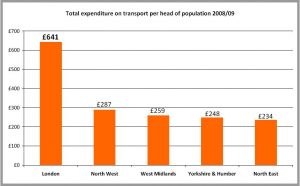A storm brewing for the city regions outside London?
It’s not just the indifferent weather that’s been casting shadows over the long summer days. At the back of many minds is uncertainty and concern over just how bad it’s going to be once the spending review kicks in from the Autumn onwards. And for local transport outside London – it could be very bad indeed. This is because bus services are at the wrong end of a series of much higher level decisions. Transport gets less protection than other Departments (like health and education). Within transport there are inescapable costs and commitments – as well as areas of the budget that are subject to long term deals (such as national rail and London). Once you’ve factored that in, this means all the cuts have to come out of more discretionary areas of spend – which is not fixed or subject to long term deals. One of those areas is local transport outside London. Add into this mix the rising costs of the legally mandatory national concessionary travel scheme and you are looking at some frightening scenarios for what happens to available budgets for non-mandatory spending on concessionary fares, BSOG, tendered services, bus stations and stops, bus priority schemes, information and promotion, safety and security schemes and all the other things that hold a bus network together. Indeed analysis for pteg by Grant Thornton suggests that non-protected areas of the transport budget (including local transport spending outside London) could be reduced by nearly 90% for capital spending by 2014/15 whilst revenue spend could fall by between 56% and 85% over the same period.
Looking North
One rarely senses excessive interest or concern from Whitehall officials about the fate of anything north of the home counties but the politics of getting some of this stuff wrong has been picked up by Ministers. For example how will it play for the Government to be funding a free bus pass for pensioners at a cost of £1 billion a year when bus services are evaporating and young people are losing their concessions? And how will it go down if London is still spending on ‘nice to haves’ like the Routemaster replacement, when frontline transport services in the next tier of major cities are being cut? The way in which the coalition in support of retaining BSOG came together so quickly was also encouraging. Usually it’s very difficult to get much interest in the media, or from other organisations, on bus policy issues – but here in a matter of weeks we had environmental groups, trade unions, CPT and pteg all fully behind it -and getting coverage in the national press. That also sent a message to Ministers that buses might not be as politically invisible as perhaps was once the case.
There is a risk of excacerbating the already large funding gap between London and the North and West Midlands
Avoiding a ‘perfect storm’
So how could Ministers avoid some of the worst case scenarios? Firstly, there’s a need to ensure that regional balance is carefully factored into the transport spending review as a whole – to avoid exacerbating the funding gap between London and the regions. Secondly, existing subsidies (CT, BSOG and local transport authority revenue budgets) for the bus industry need to be considered in a more holistic way, rather than in silos. The cumulative effect of separately considered reforms/cuts to these flows is what will count in terms of what future bus services will look like on the ground. In the city regions we believe that the PTEs would be well placed to get better value from these flows by targeting them in a way which meets local circumstances and aspirations – rather than continuing with flat rigid national pay-out systems which inevitably results in windfalls, under-payments and unintended consequences. However, whatever is ultimately decided on bus subsidies it should be on the basis of the cumulative impacts rather than on incrementalism and silo thinking. At least in the men who are making the decisions – Norman Baker and Phillip Hammond – we have a combination of social conscience and forensic accountancy that has the collective capability to make some astute decisions. The big question is how much wriggle room will the spending review as a whole give them to make the best use of what funding remains for local transport outside London? In the city regions the bus is still a major player in the transport market rather than the niche player or a social safety net it can be elsewhere. Keeping it that way is about to get harder.
Jonathan Bray
This article was first published in Coach and Bus Week
